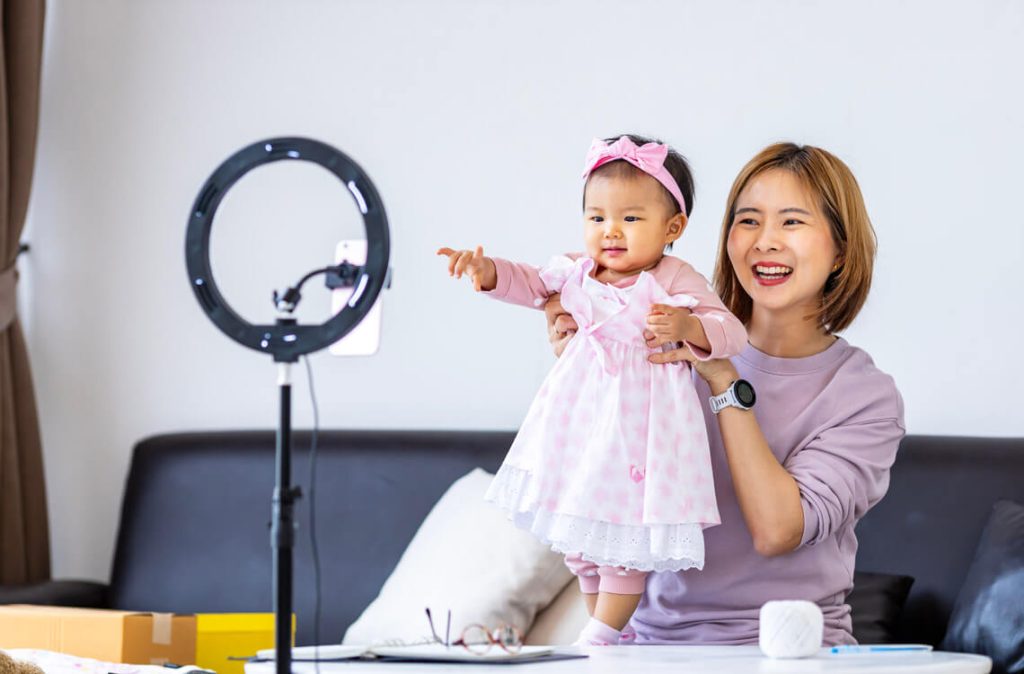It used to be that parents would pull out a photo album when they wanted to share a proud moment. Maybe a baby’s first steps or a messy cake smash on a birthday.
Today, those same moments live online, broadcast to thousands (or sometimes millions) of strangers.
Welcome to the era of the parent influencer, where family life is not just documented but monetised.
At first glance, it may look harmless, even sweet.
A mum posts a video of her toddler’s first words, a dad shares the hilarious tantrum over mismatched socks, and people around the world smile and hit “like”.
But beneath the cuteness, something much bigger is happening.
Children are becoming the stars of an industry they never asked to join.
And unlike TV child actors, these kids don’t have agents, contracts, or sometimes even protections. They just have parents with iPhones.
The New Family Business
Influencer culture has exploded, and parenting is one of the hottest niches.
Companies love tapping into mum and dad accounts because they feel authentic.
A product shown in a family kitchen looks more relatable than in a glossy ad.
And the pay can be real money – sponsorships, free products, and sometimes enough income for a parent to quit their job.
For families, it can feel like a dream.
You’re home with your kids, you’re making money, and you’re documenting the journey.
But here’s the catch: those kids have no say.
The moment they’re born, many are introduced to the Internet through birth vlogs, ultrasound reveals, or Instagram photos.
Before they can talk, their lives are content. Every milestone becomes material; every meltdown can be monetised.
Whose Story Is It, Really?
Imagine growing up and realising that your toilet-training accidents, your awkward school play, and even your teenage acne phase were posted online for strangers to laugh at.
These aren’t private family memories – they’re public entertainment.
And unlike old home videos stored in a drawer, the Internet never forgets.
Some parents may argue that their kids “don’t mind”.
But how could they? A toddler doesn’t understand privacy.
A six-year-old can’t grasp the permanence of a digital footprint. The consent here isn’t real – it’s imagined by the adults in charge.
And let’s be honest: kids can change their minds.
What if a child, now 14, decides they hate the fact that their first steps were part of a diaper ad?
Can they erase that from the web? Not really. Their childhood becomes less theirs and more a brand asset.
The Money Question
Here’s where it gets uncomfortable.
Child actors in Hollywood have protections like the Coogan Act, which forces parents to save part of their kids’ earnings.
In Malaysia, thus far, influencer kids have no such protection. All the brand money usually goes to the parents.
Some parent influencers are responsible and set aside savings, but others don’t. It’s messy.
When family life becomes business, the line blurs.
Is that tantrum being filmed because it’s funny or because it’ll go viral on TikTok?
Is that Raya open house video about family tradition or about product placement?
Suddenly, moments of childhood are not just memories—they’re marketing.
What Happens When the Kids Grow Up?
We’re only just beginning to see the first wave of influencer kids hit adolescence. And some aren’t happy.
Stories are emerging of teens asking their parents to take down years of videos, only to be told it would “hurt the brand”.
Others speak out about the anxiety of being recognised by strangers who know intimate details about their lives.
Think about it: How do you carve out your own identity when your childhood has already been packaged, branded, and consumed? Where do you find privacy when the world feels entitled to your memories?
A Different Way Forward
So, what’s the answer?
Do we ban parents from posting their kids at all?
That feels extreme, and let’s face it, parents have always loved showing off their children.
Sharing photos isn’t the problem. The problem is when kids become full-time content.
Some families are starting to draw firmer boundaries.
They blur faces. They share milestones without oversharing details. Some only accept sponsorships centred on the parent, not the child.
These small steps matter.
They protect the child’s dignity and leave room for them to shape their own online identity later.
But ultimately, it’s about a cultural shift.
As viewers, we also have power. When we stop demanding constant access to every corner of a family’s life, the pressure to perform eases.
When we ask ourselves whether a child’s embarrassing moment should really be “liked”, we’re helping draw the line.
The Uncomfortable Truth
Parent influencers aren’t villains. Most are loving parents trying to make ends meet or share their journey.
But love doesn’t erase the privacy cost.
These kids are too young to defend their boundaries, so it’s on adults – both parents and society – to step in.
We may one day look back on this era the way we now look at reality TV kids from the early 2000s – with a bit of discomfort.
We may wonder how much of their future was shaped by choices they never got to make.
Until then, maybe the next time we scroll past a video of a child’s meltdown, we should pause.
Would we want our own childhood mistakes immortalised for millions? Probably not. And that should tell us something.
For more insightful stories and fun recipes, stay tuned to Motherhood Story!
